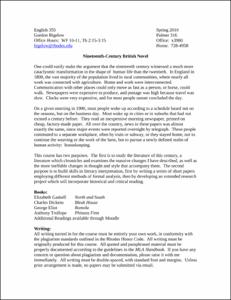Please use this identifier to cite or link to this item:
http://hdl.handle.net/10267/15488| Title: | ENGL 355-01, Nineteenth-Century British Novel, Spring 2010 |
| Authors: | Bigelow, Gordon |
| Keywords: | English, Department of;Syllabus;Academic departments;Curriculum;Text;2014 Spring |
| Issue Date: | 13-Jan-2010 |
| Publisher: | Memphis, Tenn. : Rhodes College |
| Series/Report no.: | Syllabi CRN;20605 |
| Abstract: | One could easily make the argument that the nineteenth century witnessed a much more cataclysmic transformation in the shape of human life than the twentieth. In England in 1800, the vast majority of the population lived in rural communities, where nearly all work was connected with agriculture. Home and work were interconnected. Communication with other places could only move as fast as a person, or horse, could walk. Newspapers were expensive to produce, and postage was high because travel was slow. Clocks were very expensive, and for most people sunset concluded the day. On a given morning in 1900, most people woke up according to a schedule based not on the seasons, but on the business day. Most woke up in cities or in suburbs that had not existed a century before. They read an inexpensive morning newspaper, printed on cheap, factory-made paper. All over the country, news in these papers was almost exactly the same, since major events were reported overnight by telegraph. These people commuted to a separate workplace, often by train or subway, or they stayed home, not to continue the weaving or the work of the farm, but to pursue a newly defined realm of human activity: housekeeping. This course has two purposes. The first is to study the literature of this century, a literature which chronicles and examines the massive changes I have described, as well as the more ineffable changes in thought and style that accompany them. The second purpose is to build skills in literary interpretation, first by writing a series of short papers employing different methods of formal analysis, then by developing an extended research project which will incorporate historical and critical reading. |
| Description: | This syllabus was submitted to the Office of Academic Affairs by the course instructor. Uploaded by Archives RSA Josephine Hill. |
| URI: | http://hdl.handle.net/10267/15488 |
| Appears in Collections: | Course Syllabi |
Files in This Item:
| File | Description | Size | Format | |
|---|---|---|---|---|
| 2010_SPRING_ENGL_355_01_20605.pdf | 129.45 kB | Adobe PDF |  View/Open |
Items in DSpace are protected by copyright, with all rights reserved, unless otherwise indicated.